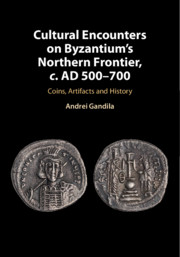
- Cited by 5
-
Cited byCrossref Citations
This Book has been cited by the following publications. This list is generated based on data provided by Crossref.
Prohászka, Péter 2020. Neue Alte Kupfermünzen Des Kaisers Justinian I. Aus Dem Karpatenbecken. Acta Archaeologica Academiae Scientiarum Hungaricae, Vol. 71, Issue. 2, p. 669.
Durak, Koray 2021. The commercial history of Trebizond and the region of Pontos from the seventh to the eleventh centuries: an international emporium. Mediterranean Historical Review, Vol. 36, Issue. 1, p. 3.
ERYILMAZ, Ünal 2021. Avar Kağanlığı'nın iktisadi tarihi. Ömer Halisdemir Üniversitesi İktisadi ve İdari Bilimler Fakültesi Dergisi, Vol. 14, Issue. 3, p. 1091.
Gandila, Andrei 2022. Fighting against nature: Romans and Barbarians on the Icy Danube. Journal of Ancient History, Vol. 10, Issue. 1, p. 135.
Prohászka, Péter and Rózsa, Zoltán 2022. Frühmittelalterliche byzantinische Kupfermünzen aus dem Raum von Orosháza (Komitat Békés, Ungarn). Acta Archaeologica Academiae Scientiarum Hungaricae, Vol. 73, Issue. 1, p. 57.
- Publisher:
- Cambridge University Press
- Online publication date:
- October 2018
- Print publication year:
- 2018
- Online ISBN:
- 9781108666374
- Subjects:
- Area Studies, History, European Studies, European History 450-1000




